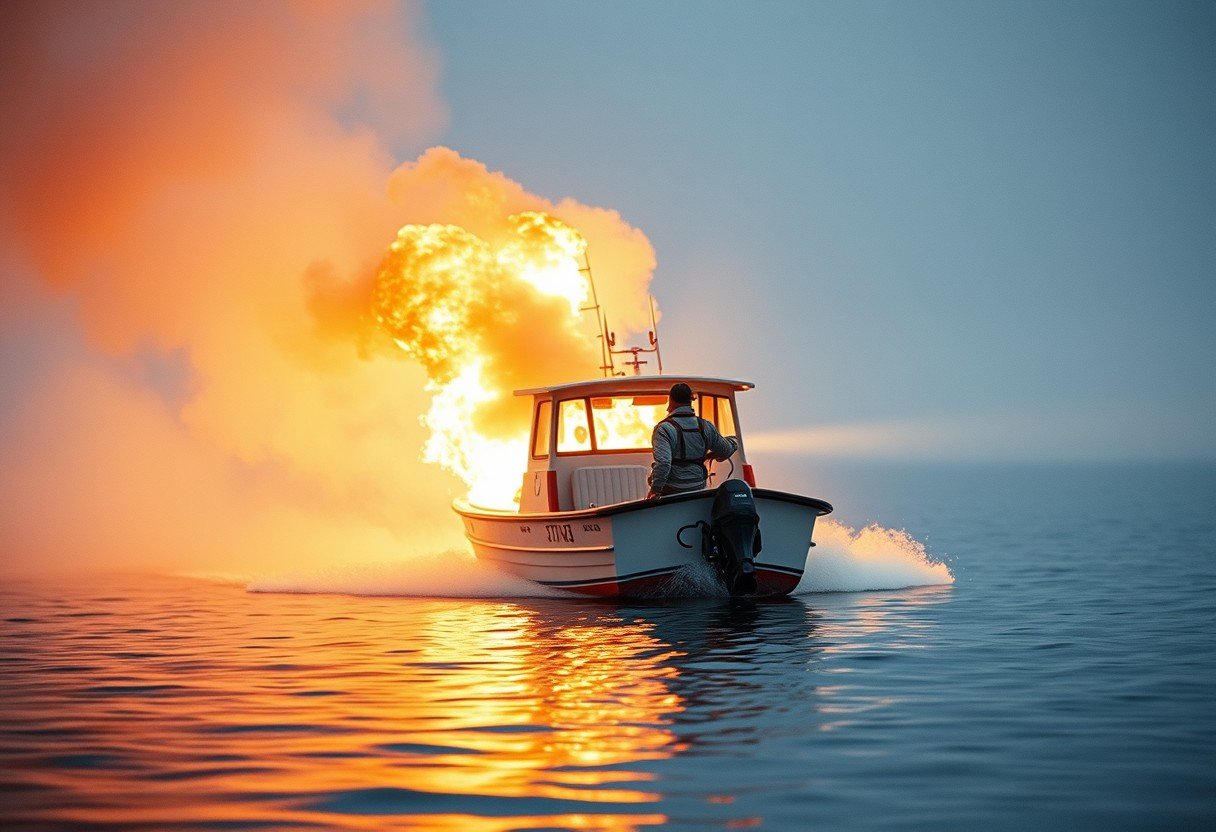A fire breaking out on your boat is a terrifying scenario, but your immediate actions can make all the difference. Knowing how to respond quickly, use safety equipment correctly, and when to evacuate is crucial for the safety of everyone on board. This guide explains the essential steps to take, from the first sign of smoke to dealing with the aftermath, ensuring you are prepared for such an emergency on the water.
Your First Moves When a Fire Starts
The moment you detect a fire, your priority is to remain calm and act decisively. Panic can cloud your judgment and waste precious seconds. Immediately assess the size and location of the fire.
Your next action should be to alert everyone on board. Shout “Fire!” or use your boat’s alarm system. A swift alert ensures all passengers are aware of the danger and can prepare for the next steps, whether that is fighting the fire or evacuating the vessel. If possible, turn your boat so the fire is downwind, which can help blow the flames and smoke away from you and the rest of the boat.
The primary focus is on your safety and that of your crew. If there are other crew members, delegate tasks clearly. One person can prepare the fire extinguisher while another readies the life jackets and makes a distress call.
How to Correctly Use a Fire Extinguisher
If the fire is small and you believe you can manage it, grab a fire extinguisher. Most boats are required to have marine-rated fire extinguishers on board. Before you try to fight the fire, make sure you have a clear escape route behind you in case the situation worsens.
Always use the PASS method to operate a fire extinguisher effectively. This simple acronym is easy to remember in a stressful situation and ensures you use the device correctly.
- Pull the pin at the top of the extinguisher.
- Aim the nozzle at the base of the fire, not at the top of the flames.
- Squeeze the lever slowly and evenly.
- Sweep the nozzle from side to side, covering the entire base of the fire.
Continue to watch the area even after the flames are out, as it could reignite. If the fire does not immediately begin to subside, it is time to abandon your efforts and evacuate.
When and How to Safely Evacuate Your Vessel
Making the decision to abandon your boat is difficult, but it is the most important one you can make for survival. If the fire grows rapidly, produces thick black smoke, or is near the fuel source, you must evacuate immediately. Your life is more valuable than your boat.
Before anyone enters the water, ensure every single person is wearing a life jacket. Move calmly towards your designated evacuation point, staying low to the ground to avoid inhaling toxic smoke. Do not waste time gathering personal belongings. Grab your emergency communication device, like a VHF radio or phone, only if it is immediately accessible.
Once in the water, group everyone together and move as far away from the burning boat as possible to avoid potential explosions or spreading fuel. Use a whistle or flares to signal for help while you wait for emergency responders to arrive.
Calling for Help on the Water
As soon as the fire is detected, a distress call should be made. If you have a VHF radio, use Channel 16, which is the international distress channel. Repeat “Mayday, Mayday, Mayday,” followed by your boat’s name, your precise location (using GPS coordinates if possible), the nature of the emergency (fire on board), and the number of people on your vessel.
If you do not have a radio, use your mobile phone to call the Coast Guard or local emergency services. Provide the same critical information. Clear and calm communication is vital to help rescuers find you quickly. Stay on the line until the operator confirms they have all the necessary information.
Fire Prevention is Your Best Defense
The best way to handle a boat fire is to prevent one from ever starting. Regular maintenance and safety checks are non-negotiable for any boat owner. According to the U.S. Coast Guard, electrical system malfunctions are a leading cause of boat fires, making inspections even more critical.
Create a routine checklist to ensure your boat remains a safe environment.
- Regularly inspect electrical wiring for any signs of wear, corrosion, or loose connections.
- Check fuel lines and connections for leaks. The smell of gasoline in the bilge is a major red flag.
- Store flammable materials like cleaning supplies and spare fuel in well-ventilated areas away from heat sources.
- Ensure your cooking equipment is secure and never leave it unattended while in use.
Having the right safety gear on board and knowing how to use it is just as important.
Boat Fire Safety Equipment Checklist
| Equipment | Status Check | Location |
| Fire Extinguishers | Check pressure gauge monthly; ensure it’s not expired. | Easily accessible in galley, engine room, and helm. |
| Smoke Detectors | Test batteries monthly. | In cabin and sleeping areas. |
| Life Jackets | Inspect for tears and proper fit for all passengers. | Readily accessible, not locked away. |
| Flares/Signaling Devices | Check expiration dates annually. | Stored in a dry, easy-to-reach location. |
Frequently Asked Questions about Boat Fires
What is the most common cause of boat fires?
Most boat fires originate from issues within the electrical system, such as faulty wiring, overloaded circuits, or improper installations. Fuel system leaks are another major cause, so regular inspection of both systems is crucial for prevention.
Should I use water to put out a fire on my boat?
You should never use water on a fuel or electrical fire, as it can spread the flames or cause electrocution. Water is only effective on fires involving common combustibles like wood or paper. Always use a proper marine-rated fire extinguisher designed for different fire types.
How many fire extinguishers should I have on my boat?
The number of fire extinguishers required depends on the size of your boat. However, it is always a good idea to have more than the minimum requirement. Place them in easily accessible locations, such as near the engine compartment, in the galley, and at the helm station.
What should I do after a boat fire?
Once everyone is safe, you must report the incident to the Coast Guard or local authorities. You will also need to contact your insurance provider as soon as possible to begin the claims process. Document the damage with photos if it is safe to do so.








Leave a Comment